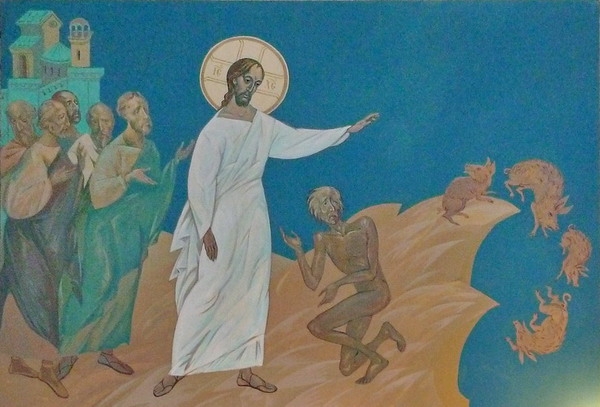Do you have demons? For many, the question evokes images from Poltergeist: heads spinning, screaming, weird voices, levitation…
We tend to think of demon possession in such dramatic terms, and yet, for people in antiquity, saying that someone “has a demon” was the common explanation for anything that compelled people to do things beyond their control.
For instance, the boy who suffers from epilepsy in Saint Matthew’s Gospel (Matt. 17:15) is described in the Gospel of Saint Mark as having a “dumb spirit” (Mark 9:17) that “ has often cast him into the fire and into the water, to destroy him.” (Mark 9:22) Since God’s Spirit is the spirit of life and immortality, the force that compels the epileptic boy to destroy himself is a sure sign that an enemy spirit is at work.
In the world of the Scriptures, demon possession was simply a more extreme version of what all human beings must endure in a fallen world consigned to Beelzebul the “prince of demons.” The basic Greek word for suffering—Pascho—implies far more than mere pain, as we sometimes think. For the men and women of the ancient world, suffering was the basic condition of being subject to things beyond our control. If permitted, this subjection would inevitably drive us to destruction and death. The dramatic seizures of a demoniac was simply the end result of any human life that was not redeemed through repentance—which means more than ‘being sorry,’ but rather refers to the act of crying out to God for mercy, much as a child raises his hands to his mother for help and comfort.
The purpose of suffering, therefore, is simply so that we might recognize our powerlessness over forces that subject us, and seek help in God. As Saint Paul puts it, “God has consigned all men to disobedience, that he may have mercy upon all.” (Romans 11:32)
This verse reminds me of times when my children have demanded to do things that I know they cannot do (such as tie their own laces), and I, finally worn down by their insistence, give in and let them try by themselves, knowing full well that they will soon give up and ask me to do what I was ready to do in the first place… This is more than a reality of parenting; it’s a fundamental spiritual principle: our wills are finally perfected when they are finally surrendered. The human will exists to give itself up.
In the language of the Scriptures, all human beings battle with demons. They make take obvious forms, such as chronic illness, poverty, addiction, or mental disorders. Or they may be subtler yet: fears, worries and resentments that plague us daily. And of course there’s the ultimate ‘demon’ of time and history, to whom we are all consigned, and who slowly wears us down and drives us towards decrepitude and death.
How do we conquer these adverse powers that seek to destroy us? How do we overcome the disobedience to which we have been consigned? The Scriptures are clear: we cannot. Like the child who cannot tie her own laces, we are simply not adequate to the task. Only a God who conquers it from the inside, can truly save us.
This indeed is the heart of the Gospel message: in Christ, the God who is above and beyond suffering willingly subjects Himself to our enslaved condition, that we might partake in His freedom from suffering. The 4th century Father, Gregory the Theologian, put it this way: “He assumed the worse that He might give us the better. He became poor that by His poverty, we might become rich. He accepted the form of a servant that we might win back our freedom. He came down that we might be lifted up…”
Our role in the process of salvation is to actively accept what God has done by surrendering our self-will to Him. This surrender is not just abstract or intellectual. God, after all, is Incarnate—a human being—and He makes Himself known in and through human instruments. Turning over our will and lives to the care of God, if it is to be effective and complete, also means surrender to another human being.
Those who battle the demon of alcohol understand well how this works. Any recovering alcoholic who works the 12-Step program will tell you how crucial meetings and sponsors are—people to whom they can surrender their powerlessness over alcohol, to whom they are accountable. In Step 5, for example, alcoholics admit “to God, to ourselves, and to another human being the exact nature of our wrongs.”
If the Scriptures are to be believed, what is true of those battling the alcoholic demon is equally true for the rest of us, who battle demons of our own. When our various compulsions and struggles come upon us, the task is simply to invite God into the battle in and through the presence of another human being.
So here’s my advice: find someone you respect, in whom the image and likeness of God shines with particularly brightness, but who is dispassionate and objective enough to tell you the unvarnished truth. When you struggle with your given demons, pray for God’s help (I find the prayer, “God, help me” works just fine), then seek your spiritual “sponsor” and surrender the struggle to them (I find that saying, “I would like to surrender my struggle with…” is all that is necessary).
In this way, God becomes more than just the God of our praise, the God of our virtue and strength. In and through His angels and ministers—our fellow human beings—He is the God of our demons also, who meets us in our weakest and darkest places. To quote Saint Gregory again, “He was tempted that through Him we might conquer. He was dishonoured that He might glorify us. He died that He might save us.”
Source: Saint Aiden Orthodox Church

















